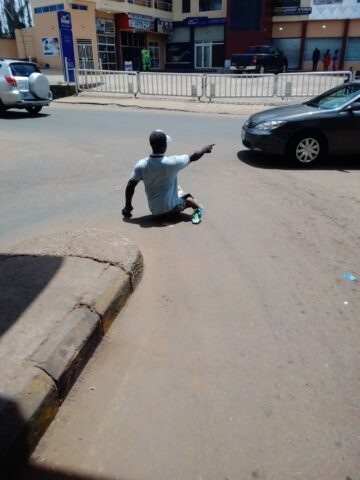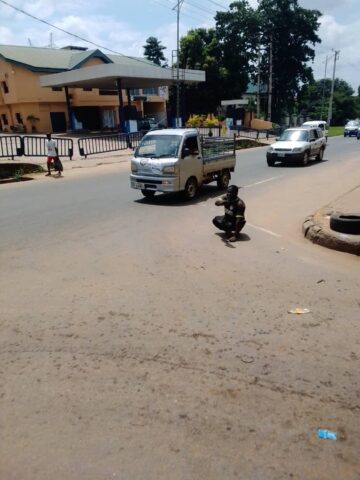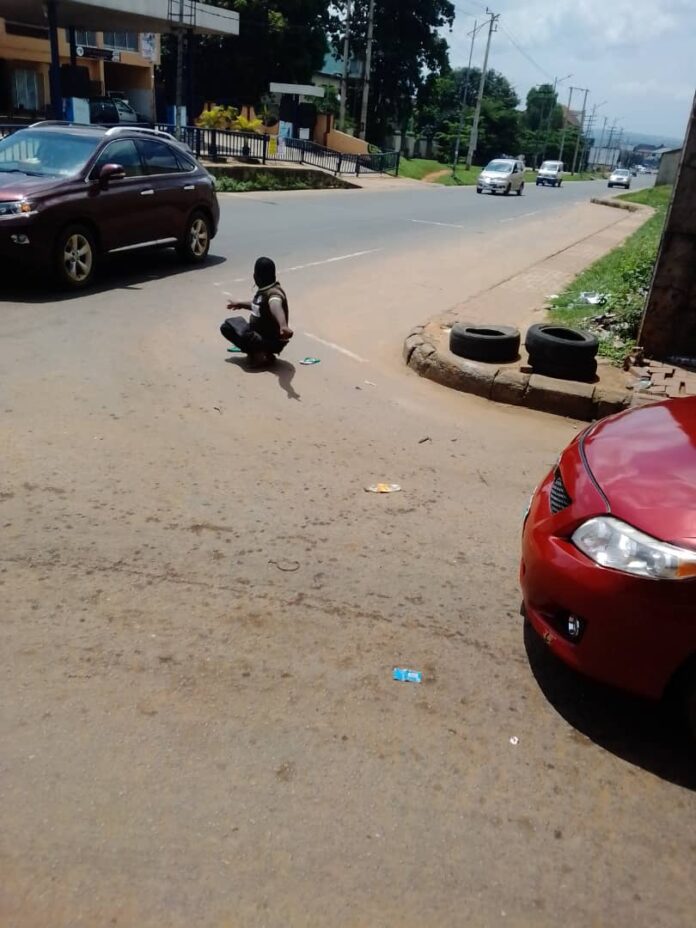It is said that “A hero is an ordinary individual who finds the strength to persevere, endure and assist others in spite of overwhelming obstacles.”
It is in line/concordance with this age-old apothegm that a group of six crippled men devoted themselves to controlling traffic in Awka, the capital city of Anambra State, to ensure free flow of human and vehicular movement for those whose legs are fit to walk and drive.
The cripples, who hail from different states, mostly in the northern part of Nigeria, left their homestates and relocated to Anambra State in search of greener pastures, as they deemed it worthy to do so, rather than become parasitic or to depend on their parents for fending and provision of their daily needs.


In other words, sitting idle in their homestates to beg around the streets for alms, was also not an option for them, as they feel the full ability in their disability.
Although, these crippled did not know themselves before, neither did they have any prior intent of meeting themselves in Anambra whem they were relocating from their individual/respective states. Howbeit, nature united them in the state.
It is also worthy to note that these cripples did not originally have the intent of coming to Anambra to control traffic as a means of livelihood when they were leaving their homestates. Rather, their intent, generally, was to come and hustle as men, to make their families proud, despite their condition.
Be it as it may, shortly after their arrival in the state, they found a vacuum to fill and an area of necessity where they can be of help to humanity. And they did not allow their condition to be a limitation to them. They make themselves available and useful.
Although, one may or may not link the existence of this vacuum these cripplea now fill to an incompetency or latency on the part of the various road traffic wardens operating in the state, both the Federal Government-owned and State Government-owned, in addition to other private and voluntary agencies that have traffic-related matters as part of their concerns. Even the inactiveness of the automated/non-human traffic wardens (the traffic lights) at the ever-busy Junction, which have been beaming only yellow light for over a year now, may or may not also have contributed to the existence of this vacuum.
Whatever be the case, the simple truth remains that there has always been a recurrent and frustrating traffic jam at the Aroma Junction in Awka, as well as at other different parts of the State when the paid traffic wardens may have finished ‘doing their thing’ and left; and even sometimes when they are still on duty.
The traffic situation usually worsens at the Junction in the evening when people must have closed from work and market, especially those crossing from one side of the road to the other. The crippled volunteers usually come out around 5.pm daily and occasionally come in the morning or noontime on sit-at-home days, as most government agencies and traffic wardens in the state do not work or show face at all at their duty post on every sit-at-home day. And this is also part of lapses that the voluntary crippled wardens have come to fill.
How do they do the work?
The six are well organised, and usually partition themselves into two groups (three in each group) when they get to the Junction. Three will be on the right side of the ever-busy road manning the traffic, while the other group will be on the other side of the road doing same. They have whistles with them (usually hung on their necks) with which they signal and exchange communication, both within themselves and between them and the motorists/road users.
Mounting on their wheelchairs, two of them would wheel to the center of each side of the road divided by a gigantic flyover, while two others would position at each side of the first crossroad under the bridge. Those positioned at the center of the road flag down, halt or pass vehicles at the time they seem necessary. They do these with either their whistles, through hand waving or through voice command (or even the combination of all), while also exchanging signals with those under the bridge to know when to hold and when to release the oncoming vehicles. By so doing they clear existing long queue if vehicles, prevent new snarl-up and generally create an ease of human and vehicular movement in the area till about 10.pm daily when they would now board tricycle and retire to their various places of residence at Amansea Garki.
Who are these crippled?
Their names are Abdullahi Abubakar (from Bauchi State), Jafar Sali (from Nasarawa State), Mohammed Sani (from Benue State), Buba Bello (from Niger Republic), Yahaya Yawaly (from Niger Republic), and Adam Isah.
When interviewed, the leader of the group, Mr. Abdullahi Abubakar (aged 27) said he relocated to Anambra State in 2010, just two years after completing his secondary school education in 2008. According to him, his reason for relocating was to hustle, rather than depending on or constituting a burden to his parents and siblings for fending and other essentials.
Married to Aisha Abubakar Abdullahi, the 27-year-old father of one said he was not born crippled. He, however, recounted how polio struck him at a very tender age, and plunged him into the pitiable condition he finds himself in till date. He noted that his child, and beautiful wife (who sells provision in Awka), are physically okay and do not have any form of deformation on any part of their bodies.
Giving more details on how he and his colleagues do their traffic control work, he said sometimes, they would divide themselves into two batches, so that when the first batch gets tired, the second batch will take over. He, however, emphasized that they do not drag the traffic control work with the officials of the government traffic agencies, as they usually step aside to give them chance to do their work whenever they sight them.
He further explained that people sometimes give them money while doing the job, which, he said they usually gather and share when they close work for the day.
“Sometimes, we will also take money from there and buy food and drinks if we are hungry. But one thing I must tell you is that we don’t beg people for money while doing the traffic work; they just on their own, give us money. It is also from that small small money they give us that we support our family and take care of ourselves,” he explained.
When asked the kind of support they need, he appealed on the government to recognize and provide them with the necessary kits for the job, which, he said, would go a long way to spur, motivate them and make their work official and more efficient.
Abubakar complained that some motorists and road users disobey, scold, intimidate and look down on them when they are stopping them; and called on the motorists to understand that the voluntary work they are doing is for their own good, and not necessarily for themselves, as they themselves “do not have legs or vehicles.”
Mr. Abubakar further stressed that government equipping them with the necessary kits would also help to attract some level of respect and obedience from the motorists who would obviously start regarding them as authorized traffic wardens.
On what he personally needs as a support, the fit-looking Abubakar said he had learnt how to ride tricycle (Keke Napep) perfectly, and therefore, appealed on the government, organisation and private individuals who is touched, to buy him a tricycle which he will use for commercial venture, to augment his daily income and put more smile on the faces of the his family members. For those who are moved to help Abubakar’s, his phone number is 08069996369.
On his own part, Jafar Sali said he is also married, with three children, and gave his wife’s name as Balila Jafar, all of whom, he also said, do not have any kind of physical challenge as himself. He also revealed that he was not born crippled but inexplicably became crippled when he was young.
Asked the kind of assistance he personally needs to be self reliant, the 23-year old who hails from Nasarawa State said he had a provision shop where also sells rice, beans, garri and others food items; and said he would appreciate any kind of support that would help to upgrade and make the shop more booming than it is currently. Jafar’s phone number is 07012224507
The third person, Mohammed Sani, from Benue State, who is married to Aisha Sani, said he was also not born crippled.
The 21-year-old father of one said he also has interest in riding a commercial tricycle, to fend well for his family and take better care of his parents who are in Benue State. He also made a general appeal to government and good-spirited individuals who may wish to support him, as he has bigger plans for his family but does not have the money to realize them. He said he recently lost his phone, but, however noted that anyone who wants to see him can do so at the Aroma Junction where they usually stay in the evening to control traffic.
Fourthly, Buba Bello, aged 42 from Nigel Republic, also said his condition befell him when he was tender, and said he came to Anambra in search of greener pastures.
Married with four children, Mr. Bello, who is an orphan, said he needed a financial support to start up a provision shop, so he would augment his daily bincome and that of his wife who sells firewood at Amansea. Bello’s phone number is 08061269144.
Similarly, Yahaha Lawaly and Adam Isah Abdullahi recounted how they surprisingly became crippled as they were hit by paralysis, which they were not born with. Both married with children, they narrated how people usually insult, neglect and intimidate them because of their condition; but, however expressed their strong belief that the downfall of a man is not the end of his life. They both also requested for tricycles or financial support to enable them take good care of their families.
When contacted for his views on the voluntary work of the crippled in ensuring ease flow of human and vehicular movements in Anambra State, the Corps Commander, Federal Road Safety Corps, Anambra State Sector Command, CC Adeoye Irelewuyi commended them for the good job, which he described as a selfless service to humanity.
While noting that safety is everybody’s business and should not be left for the traffic wardens alone, the FRSC Boss said his agency would look for a way to partner and cooperate with those crippled as well as equip them with the necessary kits and gadgets and other supports, to enable them perform optimally and also be regarded the more, like other traffic wardens.
When asked if he does not perceive any risk factor in what the crippled do, as they may be run-over by oncoming vehicles who may not see them on time, CC Irelewuyi explained that every traffic warden out there is surrounded by risks while doing their job; and added that such risk is therefore, not only peculiar to the crippled who do the job.
His words: “The fact that they are crippled doesn’t mean they are not human beings, and doesn’t mean that those who are not crippled are better than them.
“What they just need is… and what we, as an organisation will do is to partner with them, train them and give them the necessary Personal Protective Equipments (PPE), like reflective jackets, to make them more visible, especially at night.
“So, the fact that they are crippled doesn’t mean they cannot control traffic, or that they are less human beings.
“And as you asked earlier, someone who is not even physically challenged is at risk when they are controlling traffic. So, whether you are physically challenged or not, the fact that you are standing there on the road controlling traffic is a risk.
“Again, I understand that some drivers may be so aggressive and disobedient to these crippled when they are controlling traffic; but they also do the same thing to people who are not physically challenged. So, that risk you’re talking about and everything involved in controlling traffic is not peculiar to them alone.
“But, like I said before, safety is everybody’s business. And everyone should join hands to make our roads safe. And, as for the crippled, I sincerely commend them for the good work they are doing; and we’ll look for a way to partner with them. I promise you that.”
All the efforts made by this reporter to speak with the Commissioner for Transport in Anambra State, Barr. Patricia Igwebuike, proved abortive, as she did not pick her calls, and did not call back or respond to the text message sent to her on the matter.
This reporter, Izunna Okafor also visited office for interview, but could not find her on seat.
Whatever the situation be, these crippled do not need only the support of the government; private individuals, organisations and associations can also be of help to make their work easier and make life better and more meaningful for them.








